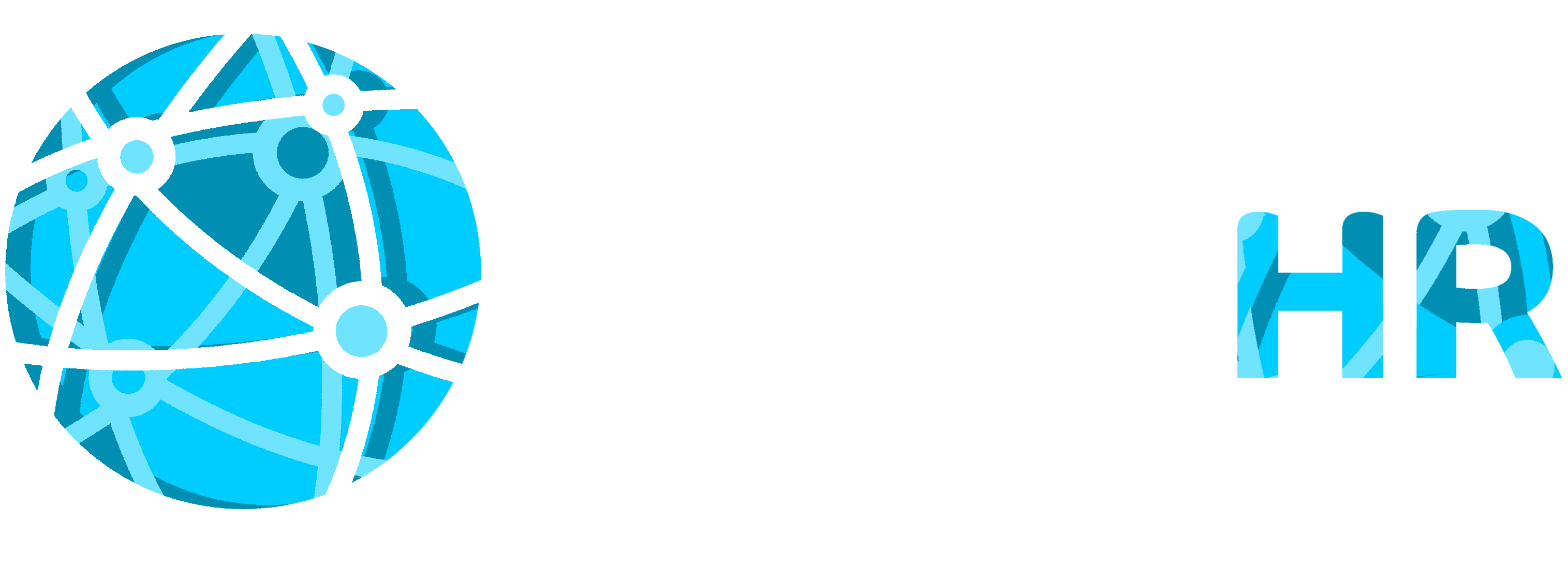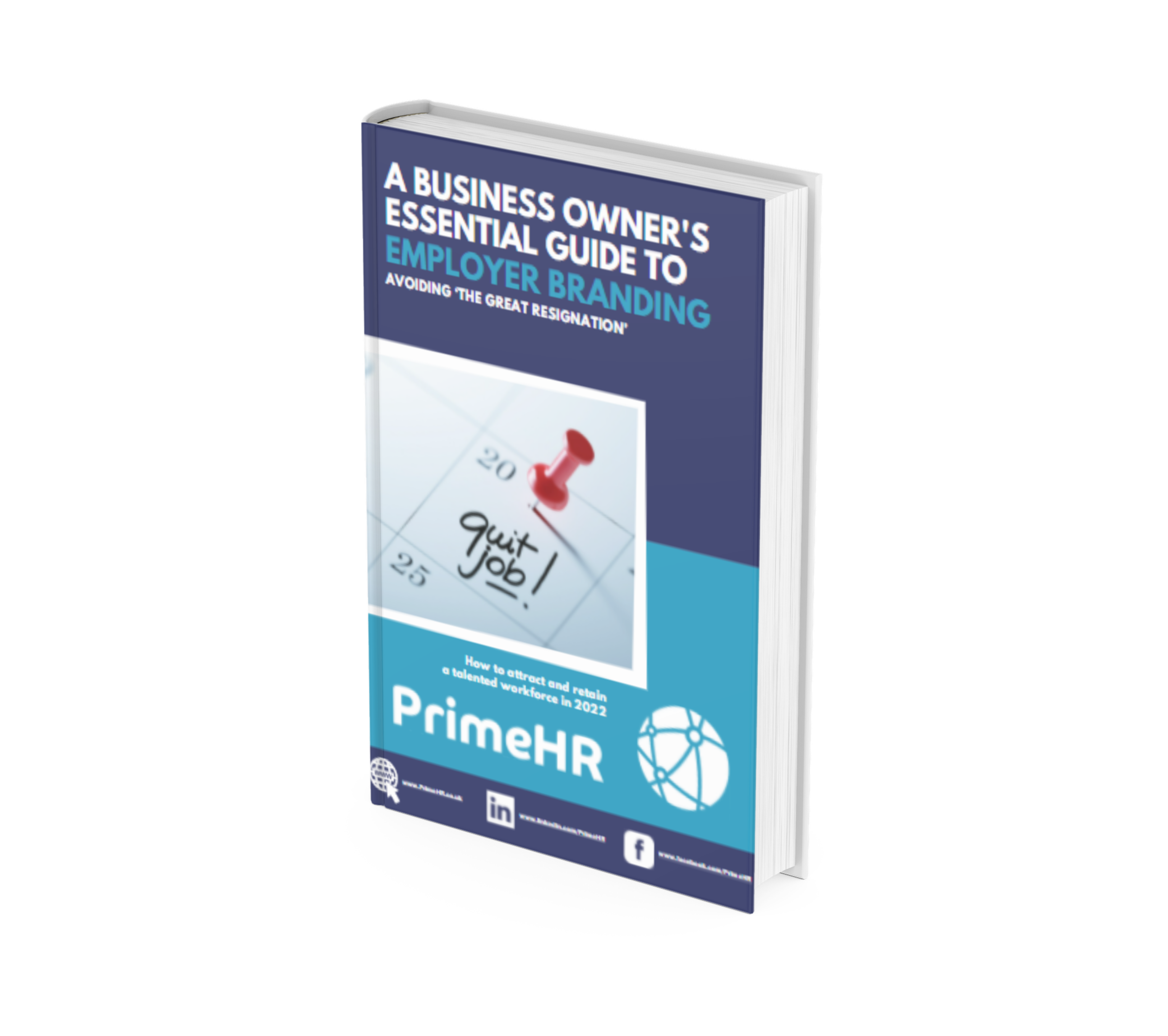Keep Up To Date
If you find our blog updates useful then consider subscribing to our newsletter for regular updates on UK Employment Law


Cookies
We require the use of cookies on our site to gather certain data to help us build our content. We also use cookies to assist in your user experience with some key functions and features of our system.
Our Policy
A BUSINESS OWNER'S ESSENTIAL GUIDE TO EMPLOYER BRANDING

AVOIDING ‘THE GREAT RESIGNATION’
- Avoiding ‘The Great Resignation
- Your Current Employer Brand
- Consciously Creating Your Brand
- People Are Key
- Measure Your Plan’s Success
- Need Some Expert HR Advice?
We’ve all heard about branding, whether it’s something you focus a lot of your time and energy on or not. It’s the combination of the image you put out to the world, along with your values and beliefs, your products or service, and the way you interact with people.
These things all combine to create a feeling in people - good or bad - that gives them an impression of what your business is really like
But when it comes to employer branding, you may be a little less sure. Many businesses simply don’t give their employer branding enough thought.
And it’s really important. Especially in today’s job market.
You see, thanks to things like social media and job sites, as well as the rise in remote working post-pandemic, it’s even easier for candidates to find their ideal job roles. Thanks to technology, it isn’t just a local pool of candidates your business is fighting to attract, it can be national, or even global.
Right now it’s a candidate-driven market. And thanks to this, many businesses are seeing a mass exodus of employees, dubbed ‘The Great Resignation’. There is far less risk to employees who are dissatisfied in their current roles right now. They can hand in their notice and feel relatively secure that their next job is just around the corner.
For employers, it’s a scarier time. Candidates can afford to be more choosy about the roles they take on, so employers really need to demonstrate just how great they are to work for. And that’s not always easy
Developing and maintaining an excellent employer brand can really give your business a competitive edge over its rivals. That’s because today, candidates are looking for more than a decent salary (although that’s still important). They want to work for a business that does something meaningful and that really makes a difference.
It’s for this reason that you need an effective employer branding strategy.
This should encompass everything, from recruitment and onboarding new employees, to your company culture, and your values and beliefs. If done correctly, it will help you to attract, engage, and retain the very best people for your business. And we all know, the people in your business are your real key to success.
So where do you start?
YOUR CURRENT EMPLOYER BRAND
What does your current employer brand look like? Even if it’s not something you’ve ever spent time developing, you already have an employer brand, like it or not! In order to shape it into what you'd like it to be, you need a clear understanding of how your employees currently view you as an employer.
Your employer brand will be reflected in the way your employees feel about your business, and what people outside of the business are saying about you. And while they might not be so vocal in letting you know their true feelings, there are a number of ways you can find out.
You could start by surveying your employees. Use a free service, such as Survey Monkey or CrowdSignal. This will allow you to email surveys to your employees and collate the results very easily. Surveys like these can be used with both current staff and leavers as part of the exit process.
You can choose whether you’d like to do this anonymously or not, though if you want real honesty it may be a good option to do so.
Websites like Glassdoor give employees an opportunity to rate their employers, too, so you can look into this.
Combining all of this information should give you a clear indication of how well your employer brand reflects what you want it to be.
CONSCIOUSLY CREATING YOUR BRAND
Now it’s time to decide what you want your employer brand to be. At this stage, it’s very important to point out that you must ensure your employer brand aligns with your core values and brand identity.
If it doesn’t, you run the risk of confusing potential employees, customers and even suppliers. This makes it all the more difficult to connect and engage with people, and your credibility goes out the window, too.
Do you want people to see you as a fun business to work for? Do you want to be seen as approachable? Ethical? Inclusive? Secure? Flexible? There are so many things to cover, so it’s important you begin this process with a very clear picture of what you want to become.
Remember, your employer brand will work to differentiate your business from your competitors, just as your overall brand will. Take the time to make it very personal and mould it to exactly what you’d like it to become.
Look at the research you’ve carried out. Does your feedback suggest areas that you’d like to make significant improvement on? Which areas are you keen to strengthen, and which areas are already strong? How can you continue to support your strengths or develop them further?
Your employer brand may naturally evolve over time. As your business grows you may develop new values or even support causes that you weren’t able to before. Make sure you revisit your employer brand strategy often, making updates where necessary.
When your plan is finished, show it off! Share it with your directors and employees and listen to their feedback. It’s really important to get buy-in across the board for your branding plan to be successful.
PEOPLE ARE KEY
You may have heard this before: people buy from people. When it comes to recruiting in today’s job market, you’ll need to be prepared to sell your business to your candidates just as much as your candidate needs to sell themselves to you.
Your brand is no longer limited to the office and its customers. Your online presence opens you up to customers, potential customers, employees, potential employees, suppliers and potential suppliers, as well as the rest of the general public. You should also make sure that everything you do online also reflects your employer brand.
If people leave reviews, take the time to reply to them - good or bad. Thank people for their feedback; address issues that are raised. If people start a conversation on your social media platforms, don’t be afraid to join in. The more involved you are, the more likely it is that your audience feels like they know you. This is a really good way to build successful relationships with not only your potential customers, but your potential employees too.
Get HR working with your marketing team to create content that also supports your employer brand. Make sure your website and social media accounts tell your story. Show off the people who are already working for you. Explain your beliefs and how they came about, demonstrate what you can offer, as both a business and an employer. Really highlight why your business is unique.
The more you can communicate about your business and its core values and beliefs, the more likely it is that the people who share them will actively seek you out, rather than you chasing after them. And these are the people that you want working with you.
The better your hires, the stronger your business and its employer brand becomes. When people are happier and more engaged, not only does productivity increase (and your turnover, with it), but the more committed your team is, and the longer they’re likely to stay with you.
MEASURE YOUR PLAN’S SUCCESS
What would a business be if we didn’t track and measure? The same thing goes for tracking and measuring how well our branding is working out for us.
Create a set of KPIs (Key Performance Indicators) to measure how successful your new plan is. Look at things like employee retention rates, the number of applicants you’re attracting per position, how long it takes to fill a position, the diversity within the business, absence, the level of employee engagement and productivity.
These indicators will work together to show you whether there’s still room for improvement, and which areas are going really well. Even if all the indications are great, don’t rest on your laurels. Make sure you are always nurturing and developing your employer brand to ensure things don’t go south.
Next you can look to see if your employer brand directly improves your EVP (that’s your Employee Value Proposition). This is the value your employees get from working for you.
It’s no good developing a smashing employer brand if it’s all for show. You need to really stand behind the values and beliefs that you’re putting out to the world, and create a workplace that lives up to its reputation.
Remember, your employees are drawn to a role by more than just money. They also want great benefits, perks and an excellent culture.
When you get it right, you should get a great return on investment.
Recruitment will be made easier, your employee retention should be high, your engagement should be excellent, with higher productivity and increased turnover, absenteeism should be down, and you should also gain more referrals (interestingly, 82% of employers rate employee referrals above other sources for generating the best return on investment).
Remember, the potential of your company lies in the hands of your people. Attract and retain the right people, and your potential is limitless. But if you get your employer branding wrong, not only will you struggle to attract people to the available roles, but you risk making bad hires and your retention rate will be shocking as well.
Right now, it’s tricky to find and attract the right candidates for your business. But if you create and maintain the right employer brand, you’ll make your business stand out from your competitors by making it far more attractive to the right people.
NEED SOME EXPERT HR ADVICE?
If you want to focus on your employer brand and your EVP and not sure where to start, we’d love to help you.
Simply give us a call or drop us an email to arrange a conversation on 01158 372 772 or email claire@primehr.co.uk